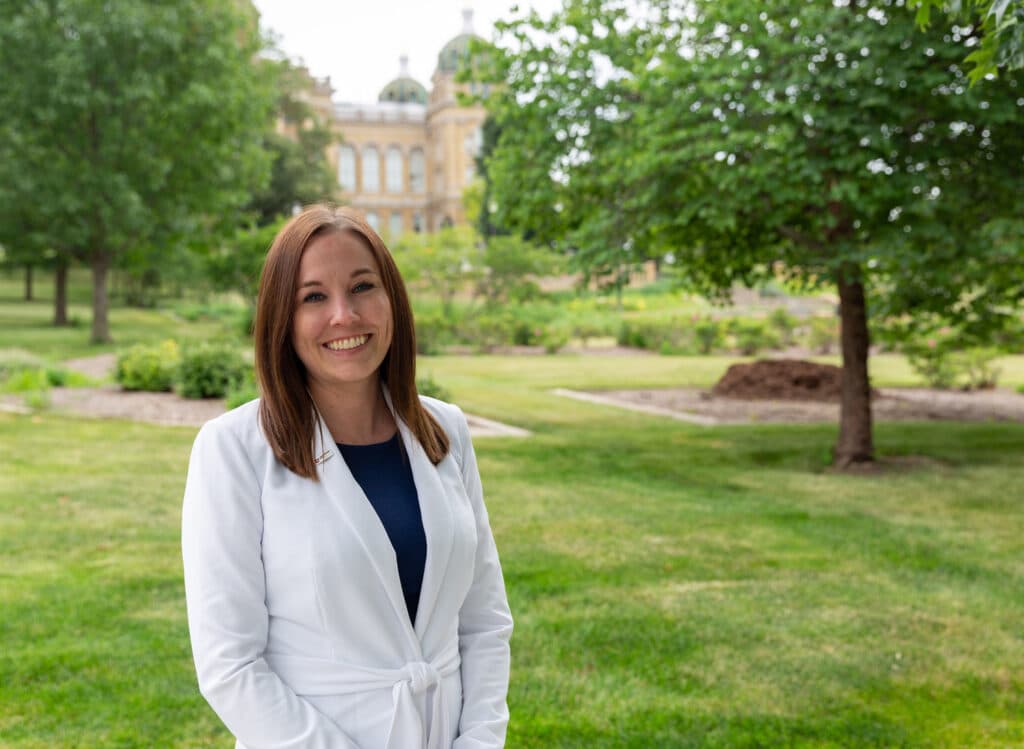A Closer Look: Dr. Rebecca Lundquist
Program Director, Broadlawns UnityPoint Health Psychiatry Residency Program

JOE GARDYASZ Aug 22, 2019 | 6:46 pm
5 min read time
1,174 wordsBusiness Record Insider, Education, Health and Wellness
Two years ago, Dr. Rebecca Lundquist stepped down as director of outpatient psychiatry at the University of Massachusetts so she could focus more of her time on training newly minted physicians in the Boston area to be psychiatrists. Lundquist, who has 25 years of medical education experience paired with her work as an outpatient psychiatrist, was hired in February by Broadlawns Medical Center and UnityPoint Health to lead the jointly administered psychiatry residency program that was launched last year. The two health systems received $2.5 million in matching state funding to establish the program through legislation enacted in March 2016. The hospitals have partnered in a long-term commitment to running the psychiatry residency program, which will also include the Central Iowa VA Medical Center in Des Moines. Iowa is in dire need of more psychiatrists; its current 200 active practicing psychiatrists ranks it near last nationally for psychiatrists on a per-capita basis. Broadlawns and UnityPoint’s initial cohort of four residents are now in the second year of the four-year program. Lundquist will also see psychiatry patients at Broadlawns with a half-time clinical practice. Her specialty interest is reproductive psychiatry, and she has worked as a consultant in obstetric clinics caring for pregnant and postpartum women with psychiatric illness as well as addictions. She and her family reside in West Des Moines.
Why was this position appealing to you?
With this program in particular, I was intrigued by the fact that the state Legislature had gotten together and said, “Hey, we don’t have enough psychiatrists in the state, so let’s fund a program and not wait for the federal government to give us more money.” … To see how much mental health is appreciated in this state was really very cool. And I’ve always loved teaching residents. I think it’s fun because they tend to be small groups.
How does the psychiatrist shortage in Iowa compare with where you came from?
According to the numbers, there are a lot more psychiatrists per capita in Massachusetts, which is in the top five. Iowa is in the bottom five. But it’s pretty hard to get a psychiatrist to see you in Massachusetts as well. I think it shows that even when you have the high numbers that we’ve gotten there, it’s still not enough. But we realistically will never train as many psychiatrists as we think we need, with the current way we practice behavioral medicine. And so we really need to be looking at creative ways of sharing expertise, things like telemedicine and consulting to colleagues. As we go forward, we’re going to continue to have more and more of a shortage until about 2025, when it’s expected to be at its worst. Over half of practicing psychiatrists are over age 65 in this country. So that’s a crisis, and it’s still not over. So these residents who are training now really need to be very versatile, and be able to somehow extend their reach to a lot of patients.
How many physicians at each hospital will you be working with in the program?
We are recruiting more and more faculty as we go along [at Broadlawns, UnityPoint Health and VA Central Iowa Health Care]. Most of the [physicians] that work at these three hospitals thought they would be training psychiatrists when they took their jobs, except for people who came within the last year or so. And so we’re transforming some of them into teachers. And that’s exciting to watch somebody who never thought of themselves as a teacher become a teacher. Others, it seems like, have just kind of been waiting their whole careers for a residency training program. A lot of them have been teaching medical students for most of their careers. We’ve had Des Moines University and University of Iowa students at all three of these institutions for decades. And so that if you can teach medical students, you can probably teach psychiatry residents.
Generally, how will the program be structured?
About half the year they’re doing medicine rotations, and half the year they’re doing psychiatry rotations, with a lot of cooperation from our other residency programs. And then when I got here, we had a lot of work to do. In the second year, when the residents spend all their time in psychiatry, we’ll begin to look at some of the subspecialties like geriatrics and addictions. I’m working with the medical director of the Iowa Department of Corrections for our residents to be able to get some exposure to correctional and forensic psychiatry. Once we figure that out, we’ll figure out the third year and we’ll figure out the fourth year, and kind of try to stay at least a few months ahead of where the residents are.
Did you decide on psychiatry early on in your career?
I thought I was going to be an engineer when I started college. My dad’s a retired professor of engineering, and my mom was a psychiatric nurse. I went to school thinking I was going to do engineering, and ended up volunteering for a crisis hotline very early on in college. I just thought that talking to patients with psychiatric concerns was the most fascinating thing I’d ever done in my life. And I called my mom up and I said, “I think I want to be a psychologist.” And she said, “Maybe think about medicine; if you do psychiatry you can be a little more flexible, you can have access to doing all the treatments.” … And so I went to medical school knowing I wanted to do psychiatry.
Do you see a lot of interest by new doctors in practicing psychiatry?
There has been a surge of interest in psychiatry in the last two or three years; it’s gotten a lot more competitive. Salaries have come up some, which has allowed people who are interested in psychiatry to really pursue that. Medical school debt when people graduate averages $300,000, which is just staggering, and choosing the profession where you make the lowest salary was not something that seemed viable for paying off $300,000 in debt. And so salaries have improved just enough that people can pursue what they’re really interested in, which is exciting.
What kind of outside interests do you have?
I have a 12-year-old daughter who keeps me pretty busy. And she’s interested in just about everything, so I’ve done some volunteering at her school. I have done things that involve being a physician. I was on committees for the Massachusetts Medical Society. When I left, I was the chair of the maternal and perinatal welfare committee, which was really a lot of fun. And I also sat on the state morbidity and mortality committee, looking at maternal morbidity in Massachusetts — I enjoyed that.
Hobbies?
I like to sing, but I haven’t done it in a while. I may get back into it. I grew up singing in church choirs and sang some in Boston. I don’t know how good I am, but I enjoy it.










